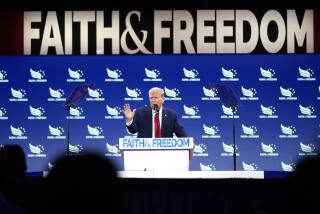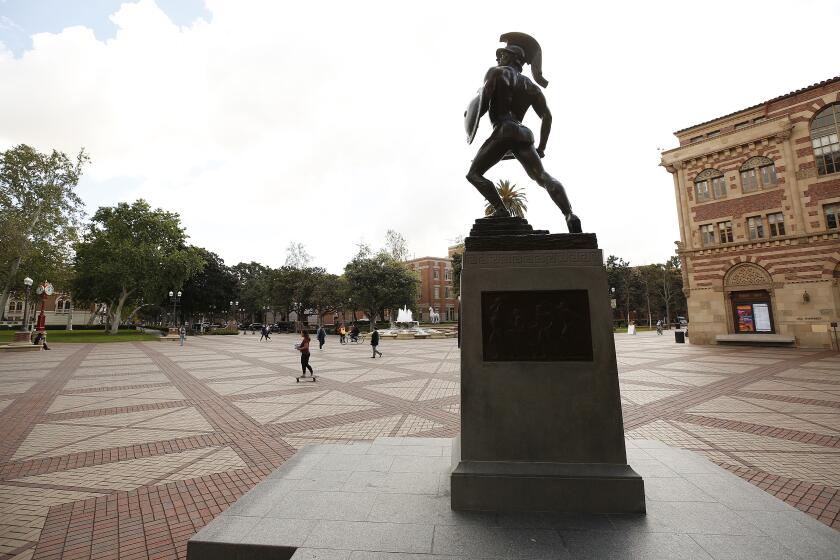Postscript: Politics in church
Several readers who disagreed with The Times’ Monday editorial, which expressed concern over priests who made political statements from the pulpit before Tuesday’s vote, noted that the same day’s paper published a photo of Gov. Jerry Brown in the pews of a South L.A. church campaigning for Proposition 30.
In a letter Tuesday, Robert S. Rodgers of Culver City asked: “Do the editors approve of Democrats going to churches to push for their causes but disapprove of Republicans speaking from the pulpit in support of their causes?”
Reader James P. Murphy of Santa Clarita raised another question: “If corporations and unions are allowed to speak publicly about candidates and issues under the guise of freedom of speech, why shouldn’t churches, regardless of denomination, be allowed to do likewise without fearing an investigation by the Internal Revenue Service? At least there will be a moral and ethical basis behind their beliefs, which neither of the aforementioned organizations has demonstrated to any degree.”
Editorial writer Michael McGough responds:
Rodgers draws a parallel between religious leaders seeking to influence the way their parishioners vote, the subject of our editorial, and the fact that Gov. Jerry Brown visited a Los Angeles church as part of his advocacy of Proposition 30. If not quite apples and oranges, this is a flawed comparison.
The federal law enforced by the Internal Revenue Service — though not aggressively enough, according to its critics — prohibits churches and other tax-exempt organizations from intervening in political campaigns on behalf of or in opposition to candidates. Brown’s visit to the church didn’t involve his candidacy for public office.
A separate provision in the law does say that attempting to influence legislation may not be a “substantial part of the activities” of a church or charity. But the church that welcomed Brown would appear to be operating under the law even if it invited him to speak in favor of Proposition 30. The editorial didn’t discuss the propriety of such visits, but obviously the editorial board wouldn’t support a double standard based on a politician’s party.
As to Murphy’s point about other groups that are free to support candidates and initiatives without looking over their shoulders for the IRS, the important difference is that unions and corporations don’t benefit from the tax-exempt status enjoyed by charities and churches. In exchange for that financially significant benefit, churches and charities agree to forgo the full exercise of their 1st Amendment rights. If a church wished to renounce its claim to tax-exempt status, it would be free to endorse candidates with impunity. (By the way, a priest or pastor isn’t prevented by the law from offering a “personal” endorsement for a candidate, though in our view that violates the spirit of the law.)
The “Pulpit Freedom Sunday” movement, which was mentioned in the editorial, argues that requiring tax-exempt churches to refrain from preaching about candidates violates the 1st Amendment’s protection of free speech and the free exercise of religion. The Supreme Court hasn’t endorsed this argument, and neither do we.
More to Read
A cure for the common opinion
Get thought-provoking perspectives with our weekly newsletter.
You may occasionally receive promotional content from the Los Angeles Times.










